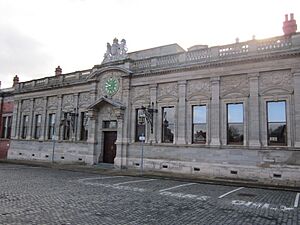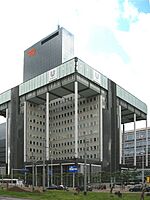Unilever facts for kids
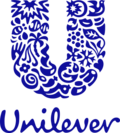
Logo since 2004
|
|
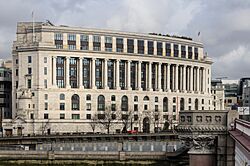
Unilever House in London
|
|
| Public | |
| Traded as | |
| ISIN | [https://isin.toolforge.org/?language=en&isin=GB00B10RZP78 GB00B10RZP78] |
| Industry | Consumer goods |
| Predecessors |
|
| Founded | 2 September 1929 |
| Founders |
|
| Headquarters | Unilever House,
London, England
,
United Kingdom
|
|
Area served
|
Worldwide |
|
Key people
|
|
| Products |
List
|
| Brands | List of Unilever brands |
| Revenue | |
|
Operating income
|
|
| Total assets | |
| Total equity | |
|
Number of employees
|
128,000 (2025) |
Unilever PLC is a big British company that makes many everyday products. It's based in London, England. The company started on September 2, 1929. This happened when a Dutch company called Margarine Unie joined with a British soap maker called Lever Brothers.
Unilever makes a huge variety of products. These include baby food, beauty items, bottled water, breakfast cereals, and cleaning supplies. They also make condiments, dairy products, energy drinks, and health products. You might know their ice cream, instant coffee, instant noodles, pet food, and toothpaste. They are the world's largest maker of soap. Their products are sold in over 190 countries around the globe.
The company is split into five main groups. These are Beauty & Wellbeing, Personal Care, Home Care, Nutrition, and Ice Cream. Unilever has special research and development centers in places like China, India, the Netherlands, the United Kingdom, and the United States.
In the 1930s, Unilever bought the United Africa Company. Later in the 20th century, the company started making more than just products from oils and fats. They grew their business all over the world. Unilever has bought many other companies over the years. Some famous ones include Lipton (1971), Brooke Bond (1984), Pond's (1987), and Colman's (1995). They also acquired Hellmann's (2000), Ben & Jerry's (2000), and Knorr (2000). In the 2010s, Unilever started focusing more on health and beauty brands.
Unilever's shares are traded on the London Stock Exchange. They are also listed on the Euronext Amsterdam and the New York Stock Exchange. It is part of the FTSE 100 Index, which is a list of the 100 largest companies on the London Stock Exchange.
Unilever's Journey: A Look at Its History
How Unilever Began (1921–1940)
Unilever was created in September 1929. It was a merger of two companies: Margarine Unie from the Netherlands and Lever Brothers from Britain. The name "Unilever" is a mix of both company names.
During the 1930s, the company grew a lot. They started new businesses in Africa and Latin America. Unilever also bought the United Africa Company. This company was formed from a merger of two trading companies that handled British trade in what is now Nigeria.
Because of the Second World War, Unilever couldn't invest money in Europe. So, they bought new businesses in the United Kingdom and the United States instead. In 1943, they acquired T. J. Lipton and a big part of Frosted Foods, which owned the Birds Eye brand in the UK. They also bought Batchelors Peas, a large vegetable canning company. In 1944, Pepsodent was added to their brands.
In 1933, Unilever Indonesia was set up. It had factories in different parts of Indonesia.
Growth and Changes (1941–1960)
After 1945, Unilever's American businesses, like Lever Brothers and T.J. Lipton, started to struggle. Unilever decided to let the American managers run things more independently.
Sunsilk hair products were first launched in the United Kingdom in 1954. Dove soap first came out in the US in 1957. Unilever took full control of Frosted Foods in 1957 and renamed it Birds Eye. They also bought the US-based Good Humor ice cream business in 1961.
By the mid-1960s, laundry soap and edible fats still made up about half of Unilever's profits. However, the market for products like butter and margarine wasn't growing much. Also, there was more competition in soaps from companies like Procter & Gamble. This made Unilever decide to make a wider range of products. In 1971, Unilever bought the British company Lipton Ltd. In 1978, they acquired National Starch for $487 million. This was the biggest foreign purchase of a US company at that time.
Expanding Globally (1961–1980)
By the end of the 1970s, Unilever had bought many companies. This helped them gain 30 percent of the ice cream market in Western Europe. In 1982, Unilever decided to focus more on being a fast-moving consumer goods (FMCG) company. This meant making products that people buy often, like food and cleaning supplies.
In 1984, Unilever bought Brooke Bond, which makes PG Tips tea, for £390 million. This was their first successful big purchase. In 1986, Unilever became stronger in the skin care market by buying Pond's. This company made products like Ragú, Pond's, Aqua-Net, Cutex, and Vaseline. In 1989, Unilever bought Calvin Klein Cosmetics, Fabergé, and Elizabeth Arden. However, Elizabeth Arden was later sold in 2000.
New Brands and Focus (1981–2000)
In 1992, Unilever Ghana was created by combining two existing companies in Ghana.
In 1993, Unilever bought Breyers from Kraft. This made Unilever the biggest ice cream maker in the United States. In the same year, they also bought the Isaly Klondike Company, which makes Klondike bars, and Popsicle Industries.
In 1996, Unilever combined some of its UK businesses. They also bought Helene Curtis. This greatly increased their presence in the US shampoo and deodorant market. This purchase brought them popular brands like Suave, Finesse, and Degree.
In 1997, Unilever sold its special chemicals division to Imperial Chemical Industries for £4.9 billion. In 1998, Unilever started a program to support sustainable agriculture.
In 2000, Unilever bought several well-known brands. These included Maille mustard, Ben & Jerry's, and SlimFast. They also acquired Bestfoods for £13.4 billion. The Bestfoods purchase helped Unilever grow its food business in America. It added brands like Knorr, Marmite, Bovril, and Hellmann's to its collection. To get approval for this deal in Europe, Unilever had to sell some other brands like Oxo and Batchelors.
Changes and Partnerships (2001–2010)
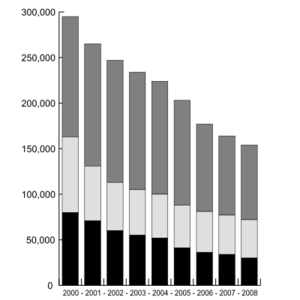
Black shows jobs in Europe, light grey shows the Americas, and dark grey shows Asia and Africa.
Between 2000 and 2008, Unilever reduced its global workforce by 41%.
Notes: Europe figures for 2000–2003 are all Europe; from 2004 figures in black are Western Europe. For 2004–2008 figures for Asia and Africa include Eastern and Central Europe.
Source: Unilever Annual Reports 2004, 2008
In 2001, Unilever split into two main parts: one for foods and one for home and personal care products. In the UK, they combined their Lever Brothers and Elida Fabergé businesses.
In 2003, Unilever announced they would sell the Dalda brand in India and Pakistan. Bunge Limited bought the Dalda brand from Hindustan Unilever Limited.
In 2002, the company sold its special oils and fats division, Loders Croklaan, to IOI Corporation. Unilever also sold brands like Mazola, Argo & Kingsfords, and Karo to ACH Food Companies.
In 2004, Unilever Bangladesh, which started in 1964, changed its name. It is owned 60.4% by Unilever and 39.6% by the Government of Bangladesh.
In 2007, Unilever teamed up with Rainforest Alliance. This partnership aimed to make sure all their tea was sourced in a way that helps the environment and local communities.
In 2009, Unilever agreed to buy the personal care business of Sara Lee Corporation. This included brands like Radox, Badedas, and Duschdas. This purchase was completed on December 6, 2010.
In 2010, Unilever bought Diplom-Is in Denmark. They also sold their tomato products business in Brazil to Cargill. Unilever purchased Alberto-Culver, a company that makes personal care and household products. This included brands like Simple, VO5, Nexxus, and TRESemmé. They also acquired EVGA's ice cream brands in Greece.
Modern Era (2011–2020)
In 2012, Unilever said it would stop using tiny plastic beads, called microbeads, in their personal care products by 2015.
In 2014, Unilever agreed to buy a large part of Qinyuan, a water purification company in China. They also acquired Talenti Gelato & Sorbetto. Unilever bought the Camay brand globally and the Zest brand outside of North America from Procter & Gamble.
In 2015, Unilever acquired REN Skincare, a British skin care brand. They also bought Kate Somerville Skincare LLC. The company also acquired the Italian ice cream maker GROM. Unilever also separated its food spreads business, which included brands like Flora and I Can't Believe It's Not Butter!. This new company was named Unilever Baking, Cooking and Spreading. This change happened because sales in this product area were slowing down.
Unilever bought the US-based startup company Dollar Shave Club for about $1 billion. This helped them compete in the male grooming market. In August 2016, Unilever acquired Blueair, a company that makes air purifiers. In September 2016, Unilever acquired Seventh Generation Inc. for $700 million. In December 2016, Unilever acquired Living Proof Inc, a hair care products business.
In 2017, Kraft Heinz made a large offer to buy Unilever, but Unilever turned it down. Unilever acquired Sir Kensington's, a condiment maker, and the personal care and home care brands of Quala, a Latin American company. They also bought Hourglass, a makeup brand, and Pukka Herbs, an organic herbal tea business. In September 2017, Unilever acquired Weis, an Australian ice cream business. They also acquired Carver Korea, a skincare business. In October 2017, Unilever acquired Mãe Terra, a Brazilian natural and organic food business. In November, Unilever announced an agreement to acquire the Tazo tea brand from Starbucks. Later in November 2017, the company acquired Sundial Brands, a skincare company. In December 2017, Unilever acquired Schmidt's Naturals, a US natural deodorant and soap company. Also in December 2017, Unilever sold its margarine and spreads division to an investment firm called KKR for €6.8 billion. This sale was completed in July 2018, and the new company was named Upfield. Upfield's well-known brands include Flora, Stork, and I Can't Believe It's Not Butter!.
To help with the global COVID-19 pandemic, Unilever announced it would donate over €100 million. This included donations of soap, hand sanitizer, bleach, and food.
Recent Developments (Since 2021)
In April 2021, Unilever created a new separate beauty business called Elida Beauty. This new company manages brands like Brut, Brylcreem, Timotei, Q-tips, and VO5.
In November 2021, Unilever agreed to sell most of its tea business, known as the Ekaterra division, to an investment firm for €4.5 billion. This deal did not include Unilever's tea business in India, Indonesia, and Nepal, or the Lipton Ice Tea partnership with PepsiCo. The deal was completed in the summer of 2022.
In December 2023, Unilever announced it would sell Elida Beauty to Yellow Wood Partners, a private equity firm in the United States.
In March 2024, Unilever shared plans to make its ice cream unit a separate business. This unit includes popular brands like Magnum and Ben & Jerry's. This change started in March 2024 and is planned to be finished by the end of 2025. This move is part of a plan to save costs, which will also involve cutting 7,500 jobs. In February 2025, Unilever announced that the ice cream unit would be listed on the Amsterdam stock market.
In December 2024, the company announced the sale of food brands Unox and Zwan to Zwanenberg Food Group. This deal is expected to be completed in 2026.
In June 2025, Unilever announced it would buy Dr. Squatch, an American personal care brand, for $1.5 billion. This deal still needs approval from regulators and shareholders.
How Unilever Works
Company Structure
Unilever used to have a special structure with two main companies, one British (PLC) and one Dutch (N.V.). Their main office is in Unilever House in London, United Kingdom. The company has changed its structure several times, including in 2018 and 2020.
In 2018, Unilever wanted to simplify this structure. They planned to have just one main office in Rotterdam, Netherlands, and combine their legal entities. However, they decided not to do this because shareholders in the United Kingdom were worried. They thought the company might lose value if it left the London FTSE100 stock index.
In October 2018, Unilever bought a 75% share in an Italian personal care business called Equilibra. They also acquired The Laundress, a company that makes high-end, eco-friendly cleaning products. In 2018, Unilever was named one of the best private sector employers in the United Kingdom.
In 2020, Unilever looked at its structure again. They decided to merge the Dutch company (N.V.) into the British company (PLC). This would create one main company based in the United Kingdom. In September 2020, shareholders in the Dutch part of Unilever voted strongly to merge with the UK company. In October 2020, 99% of shareholders in the UK part also agreed to the merger. The unification was completed on November 30, 2020. Now, there is only one type of share for the company.
Who Leads Unilever
In January 2019, Alan Jope became the chief executive officer (CEO), taking over from Paul Polman. The chief financial officer is Graeme Pitkethly.
Paul Polman was the CEO for ten years before Alan Jope.
In November 2019, Unilever announced that Nils Andersen would become the new Chairman. He replaced Marijn Dekkers.
In January 2023, Hein Schumacher was announced as the new CEO, starting in July 2023. In February 2025, Unilever announced that Schumacher would step down on May 31.
Unilever's Global Locations
-
Soap factory in Mannheim, Germany
How Unilever Operates
The United States, China, and India are very important markets for Unilever. Together, they make up more than one-third of the company's total sales.
Thirteen of Unilever's brands bring in more than half of all its sales.
Popular Unilever Brands
Some of Unilever's biggest and most famous brands include Dove, Knorr, Axe (also known as Lynx), Ben & Jerry's, Hellmann's, Lifebuoy, Lux, Magnum, Persil (also known as Omo), Rexona, Sunlight, Sunsilk, and Wall's (also known as Heartbrand).
Advertising and Marketing
Unilever's Logo
In 1930, Unilever's logo was a simple, all-capital design. The current Unilever logo was introduced in 2004. It was designed by a company called Wolff Olins. The 'U' shape in the logo is made up of 25 different symbols. Each symbol represents one of the company's smaller brands or its values. The idea behind the logo was to show how Unilever "adds vitality to life."
Dove's "Real Beauty" Campaign
Dove aims to help people feel good about how they look. They want to help people build self-esteem and reach their full potential. Dove uses its advertising to share messages about positive self-image. In September 2004, Dove started its "Real Beauty" campaign. This campaign focused on showing women of all different shapes, sizes, and skin colors. Later, in 2007, the campaign expanded to include women of all ages. These advertisements were shown on television and became very popular online.
Axe/Lynx Advertising
Axe, known as Lynx in some countries like the United Kingdom, is a brand of toiletries for young men. Its advertising often uses a playful and humorous style. These ads sometimes suggest that using the products makes men very appealing. Unlike Dove's long-running campaign, Lynx advertising often creates short series of ads for a single product. These ads sometimes cause controversy, which can bring the brand more attention. Some of these advertisements have been banned in different countries. For example, in 2012, a Lynx ad called 'Clean Balls' was banned. In 2011, a Lynx shower gel campaign was also banned in the United Kingdom.
Social Media Advertising
On June 26, 2020, Unilever announced it would stop advertising to US customers on social media platforms like Facebook, Instagram, and Twitter. This decision was made until at least the end of 2020. It followed a campaign by civil rights groups that were concerned about how these platforms handled hate speech and false information. Unilever stated that advertising on these platforms at that time "would not add value to people and society."
Later that year, in December, Unilever said it would start advertising on Facebook and its related platforms again. They felt that Facebook had made enough progress in improving its management of content. A company executive stated that they were "encouraged by the commitments the platforms are making to build healthier environments."
Company Sponsorships
From 2000 to 2012, Unilever sponsored special art commissions at the Turbine Hall in Tate Modern, a famous art museum. These commissions became known as The Unilever Series.
Who Unilever Competes With
Unilever's biggest global competitors are other large companies that make consumer goods. These include Nestlé and Procter & Gamble.
See also
 In Spanish: Unilever para niños
In Spanish: Unilever para niños
- List of food companies
 | William M. Jackson |
 | Juan E. Gilbert |
 | Neil deGrasse Tyson |


